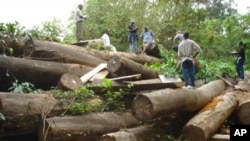Liberia and the European Union will sign a landmark trade agreement Monday that would ensure that timber products exported from Liberia to EU countries are legal.
During the regime of former President Charles Taylor, between 1997 and 2003, it is believed that all logging companies operated illegally.
The World Bank estimates that the Liberian government lost more than $200 million when timber companies evaded paying taxes.
Florence Chenoweth, Liberia’s Minister of Agriculture, says Monday’s agreement is part of President Ellen Johnson-Sirleaf’s effort to build a new Liberia that is based on the principles of good governance, transparency, and the rule of law.
“You would know that, in the past, Liberia’s wood products and logs had been exploited illegally by people who used it during our conflict to gain funding to foster their conflict. So, when this agreement enters into force, it would represent a very aggressive move by the government of Liberia,” Chenoweth says.
An EU news release notes that timber exports once accounted for more than 20 percent of Liberia’s gross domestic product [GDP], but U.N. sanctions imposed on the Taylor regime stopped the timber export.
It says the agreement is “part of a package of measures set up in the EU’s 2003 Action Plan on Forest Law Enforcement, Governance and Trade which recognizes the role of EU demand for timber products in driving illicit timber sales.”
“I want you to know that this has been driven not by the European Union, but by the government of Liberia to assist us in ensuring the European market, a market that we want to target for our forest products,” Chenoweth says.
The EU statement says the Voluntary Partnership Agreement defines what constitutes legal timber in the producer country and sets up an assurance system to verify compliance and ensure that timber for export can be traced back to the source.
Chenoweth says the Sirleaf administration has put in place measures to safeguard against illegal timber sales.
“To govern our forests and forest products, the Liberian law is in three parts. One relates to commercialization, that is to say of our products to world markets and locally. The other relates to community to make sure that our communities are benefiting, they have agreements with the Forestry Authority to do harvesting and processing of timber to benefit those communities,” she says.
Chenoweth says Liberia, with over half the rainforest remaining in West Africa, has every reason to want to conserve and protect its forests.
“The third part of our law is conservation. We are harvesting our forests now in a sustainable way. During the warlord days, our forests were over-exploited and destroyed. Don’t forget now that Liberia is home to almost half of the remaining forest in our region. So, we have all the reasons to want to conserve and protect what we have,” Chenoweth says.
She says the government has always had a reforestation policy as part of its overall law governing the forest sector.
“It is not new. We had it before; it was not respected during our civil conflict,” Chenoweth says.




